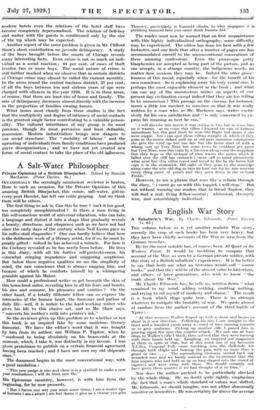A Salt-Water Philosopher
Private Opinions of a British Bluejacket. Edited by Hamish MacLaren. (Peter Davies. 6s.)
OCCASIONALLY the seemingly omniscient reviewer is beaten. Here is such an occasion, for the Private Opinions of this amazing British Bluejacket, this comic, salt-water, every-port Hamlet, has left one critic gasping. And we think there will be others.
The first' thing to ask is, Can this be true ? isn't it too good, too completely unsophisticated ? Is there a man living in this self-conscious world of universal education, who can take a language and distort it into a" shape that gradually reveals a beauty, directness, and eloquence such as we have not had since the early days of the century when Neil Lyons gave us his coffee-stall rhapsodies ? One can hardly belieVe that here is the, deliberate work of a literary artist, for if so, he must be greatly gifted : indeed he has achieved a miracle. For here is the Cockney revealed as he has rarely been before. He lives in this diary, with all his furtive self-protectiveness, his somewhat cringing impudence and sniggering scepticism. But below these negative qualities we see the simplicity of mind, the raw conscience that is always nagging him, and because of which he comforts himself by a whimpering grumble against his Maker.
How could a professional writer so get beneath the skin of this town-bred sailor, revealing him in all his fears and boasts, his sins and remorse, his pleasures and vanities ? On the other hand, if a totally illiterate fellow can so express the intricacies of the human heart, the humours and pathos of daily tifewell, it is unfair to the hard-working writer who gives his life to this elusive art, and as Mr. Shaw says, " converts hiX mother's milk into printer's ink."
So the reviewer gives up this problem as to whether or not this book is an inspired fake by some malicious literary humorist. We have the editor's word that it was bought by him from' its author, one William P. Taplow, when he " confessed to being absolutely on his beam-ends at the moment, which, I take it, was distinctly in my favour. I was given permission to publish on a certain financial agreement having been reached ; and I have not seen my old shipmate since."
The document begins in the most conventional way, with a good resolution :
" This new padge is nise and cleen it is a symbull to make a now year ressilualiuon i will do 'froth now On."
His Epicurean casuistry, however, is with him from the beginning, for he now proceeds,
" But i haves one wet you must some times, i am a soabor tipe of humans i am i aware i am but damn it give us a chance you gets Thurstoy, particklarly in hununid climbs, to whit Singapore it Is perishing humhaid here you caret drink lemons Aid."
The reader nnist now be warned that on first acquaintance with this highly individualized 'orthography, some difficulty may be experienced. The editor has done his best with a few footnotes, and one finds that after a number of 'pages one has accommodated oneself to the unconventional conventions of these amazing confessions. Even the picaresque petty blasphemies are accepted as being part of the picture, just as
one accepts, in a strange country, the indigenous weeds, no matter how noxious they may be. Indeed the utter grace- lessness of this rascal, especially when—for the benefit of his own conscience:–he is explaining away his very venial sins, is perhaps the most enjoyable element in the book ; and what can one say of the unconscious satires on aspects of our present day civilization except indeed that they are too telling to be unconscious? This passage on the cinema, for instance,
seems a little too succinct to convince us that it was really written by a man who, as Mr. Maclaren says, writes exclu- sively for his own satisfaction and " is only concerned to ex- press his meaning as best he can."
i will discribe this movie it was ixiting in bits but in some bits no it wasent. as on come this villon i knowed his tipe of kidnees immeduate but this gurl theft he were Orl Right but damn it. she were soppie. but i can spot these villons straight of, which of they gorn hi the moter didant pull up at old pars mansuon consiquinse she gets the wind up but too late but the heroe start of with a whang cort up Very Near but some bows he couldant get parst but Very Near, miss this train by a &act uon along come the airpplane Out they hops in the nickque of time leaves the meter which it failed over the cliff fair cronnick i carat, call to mind pressisively what next but this villon tryed and tryed to Do In the heroe but cops it in the stununick, Orl right of they gore to the marridge along come the nise old dog as eats its hart out for its nise mistress every thing parse of primb and they gore down in the orchurd Finish."
However, to use a phrase that runs like a refrain through the diary, " i carat go on with this toppick i will stop." But not without warning our readers that in friend Taplow, they will find a real, living fellow-mortal ; whimsical, strangely wise, and astonishingly individual.


































 Previous page
Previous page